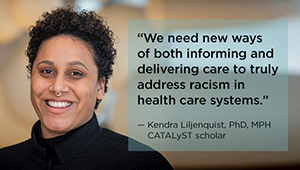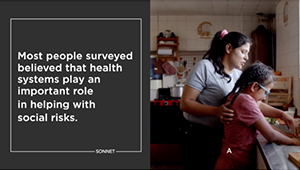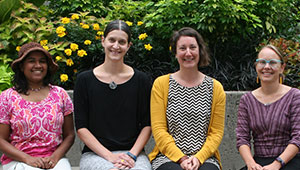Social Determinants of Health
Research overview
Social, economic, and behavioral factors can influence the trajectory of one’s health so significantly they have been coined the “social determinants of health” or SDoH. Those factors include:
- Personal characteristics such as race, ethnicity, culture, sex, gender identity, and sexual preference
- Economic resources such as educational attainment, employment, income, wealth, and housing
- Built environment such as transportation systems, access to healthy foods, and walkability
- Adverse experiences such as childhood trauma, interpersonal violence, relationship disruption, or bereavement
Researchers at Kaiser Permanente Washington Health Research Institute (KPWHRI) are committed to understanding how the health care system can best identify, understand, and appropriately respond to these factors to improve the health of our members and our communities.
“Through our evaluation and research, we hope to help empower patients to better manage the social and behavioral factors that influence their health,” said Clarissa Hsu, PhD, KPWHRI associate investigator.
Our institute researchers have long been interested in SDoH. Examples include our work in areas such as tobacco addiction and the integration of treatment for behavioral health issues into primary care. We’ve worked on efforts such as reducing racial disparities in care, opioid overuse, and vaccine hesitancy. Our Center for Community Health and Evaluation has helped to promote and sustain healthy communities; our Center for Accelerating Care Transformation (formerly known as the MacColl Center for Health Care Innovation) has championed the Chronic Care Model and has been committed to helping U.S. primary care practices — including community health centers — integrate community resources into health improvement.
Moving forward, we intend to make targeted improvements in the lives of Kaiser Permanente members, but, as these examples suggest, we also work in communities around the nation for broad impact. Here are just a few examples of KPWHRI’s current work related to SDoH:
- Moving to Health
This project is designed to pinpoint what matters most about individual neighborhoods for their residents’ health. Funded by the National Institute of Diabetes and Digestive and Kidney Diseases, researchers will track individuals and the built environment in their neighborhoods to see how changing communities affects factors such as people’s long-term weight and blood sugar — and whether they develop diabetes.
- LINCC (Learning to Integrate Neighborhoods and Clinic Care)
Researchers on this project, funded by the Patient-Centered Outcomes Research Institute, are testing how adding a community resource specialist role in primary care can help connect people with community resources that support health and wellness.
- Team-based opioid management
The goal of this project is to improve safe prescribing and chronic opioid medication for patients with non-cancer pain in rural primary care clinics across Washington and Idaho. Led by KPWHRI’s Center for Accelerating Care Transformation (ACT Center), the project is helping clinics develop policies, workflows, registries, tool kits, and other resources to better support patients with chronic pain. The work is funded by the Agency for Healthcare Research and Quality.
- Addressing financial hardship
In projects funded by the Robert Wood Johnson Foundation, a team of KPWHRI researchers is learning how health care systems can do a better job of talking transparently with patients about the cost and value of their health care. The goal is to help identify “best practices” for making tools and resources part of regular workflows in clinics. Doing so could ultimately help patients have a better understanding of what their care will cost — information that’s important for helping individuals make informed decisions about treatment based on their own values.
KPWHRI researchers are committed to gaining a holistic understanding of people’s lives — one that can best inform prevention, intervention, and implementation efforts, maximizing the public health impact of our efforts.
KPWHRI researchers have a unique constellation of methodological strengths — including qualitative analysis, implementation science, and experience with evidence reviews, evaluation design and methods, measurement development, big data analysis for community intervention evaluation, pragmatic trials, user-centered design, survey research, and community-based participatory research. These strengths are coupled with substantive expertise (for example, nutrition, physical activity, behavioral health, economic and racial disparities, prevention and health promotion, child health and development, and stigma), and a multi-disciplinary, team-science-based approach that is needed to tackle these “thorny issues.”
We hope to realize the optimal role of the health care system in addressing social, economic, and behavioral needs, and partner with the community to create much needed change.
Recent publications on Social Determinants of Health
Llamocca EN, Ahmedani BK, Lockhart E, Beck AL, Lynch FL, Negriff SL, Rossom RC, Sanchez K, Sterling SA, Stults C, Waring SC, Harry ML, Yu H, Madziwa LT, Simon GE. Use of ICD-10-CM codes for adverse social determinants of health across health systems. Psychiatr Serv. 2024 Sep 23:appips20240148. doi: 10.1176/appi.ps.20240148. [Epub ahead of print]. PubMed
Grant RW, McCloskey JK, Uratsu CS, Ranatunga D, Ralston JD, Bayliss EA, Sofrygin O. Predicting self-reported social risk in medically complex adults using electronic health data. Med Care. 2024 Jun 4. doi:10.1097/MLR.0000000000002021. [Epub ahead of print]. PubMed
Brown MC, Paolino AR, Barnes KA, Papajorgji-Taylor D, Solomon LS, Lewis CC, Bojkov E, Coleman KF. Codesigning online continuing medical education on social health integration and social risk-informed care for primary care providers. Perm J. 2024 May 10:1-10. doi: 10.7812/TPP/23.113. [Epub ahead of print]. PubMed
Clennin M, Reifler L, Goodman O, Brown MC, Vupputuri S, Daugherty SL, Schootman M. Association of housing instability with obesity status among insured adults. Am J Prev Med. 2024 Apr 20:S0749-3797(24)00135-1. doi: 10.1016/j.amepre.2024.04.008. [Epub ahead of print]. PubMed
Rosenberg DE, Cruz MF, Mooney SJ, Bobb JF, Drewnowski A, Moudon AV, Cook AJ, Hurvitz PM, Lozano P, Anau J, Theis MK, Arterburn DE. Neighborhood built and food environment in relation to glycemic control in people with type 2 diabetes in the moving to health study. Health Place. 2024;86:103216. doi: 10.1016/j.healthplace.2024.103216. Epub 2024 Feb 23. PubMed
Parchman M, Stefanik-Guizlo K, Shah A, Glaseroff A, Holden E, Bertko J, Zúñiga R. How to identify and support emerging risk Medi-Cal members with complex social and behavioral needs. CHCF. Jan. 2, 2024. PubMed
Singer AR, Coleman KF, Mahmud A, Holden E, Stefanik-Guizlo K. Assessing the feasibility of an empathic inquiry approach to social needs screening in 10 federally qualified health centers. Perm J. 2023 Oct 13:1-7. doi: 10.7812/TPP/22.178. [Epub ahead of print]. PubMed
Warner ET, Huguet N, Fredericks M, Gundersen D, Nederveld A, Brown MC, Houston TK, Davis KL, Mazzucca S, Rendle KA, Emmons KM. Advancing health equity through implementation science: Identifying and examining measures of the outer setting. Soc Sci Med. 2023 Aug;331:116095. doi: 10.1016/j.socscimed.2023.116095. Epub 2023 Jul 17. PubMed
Researchers in Social Determinants of Health
 Clarissa Hsu, PhDAssociate Investigator |
 Katharine A. Bradley, MD, MPHSenior Investigator |
 Paula Lozano, MD, MPHSenior Investigator; Director, ACT Center |
 David E. Arterburn, MD, MPHSenior Investigator |
 Joseph E. Glass, PhD, MSWAssociate Investigator |
 Beverly B. Green, MD, MPHSenior Investigator |
 Allen Cheadle, PhDSenior Investigator, KPWHRI; Senior Research Associate, CCHE |
 Paula R. Blasi, MPHCollaborative Scientist |
 Gwen Lapham, PhD, MPH, MSWAssistant Investigator |
 Marlaine Figueroa Gray, PhDAssistant Investigator |
 Gregory E. Simon, MD, MPHSenior Investigator |
 Andrea J. Cook, PhDSenior Biostatistics Investigator |
 Dori E. Rosenberg, PhD, MPHSenior Investigator |
 Jennifer F. Bobb, PhDAssociate Biostatistics Investigator |
 Katie Coleman, MSPHDirector, ACT Center |
 Robert Penfold, PhDSenior Investigator |
 Jennifer B. McClure, PhDDirector, Investigative Science |
 Leah K. Hamilton, PhDSenior Collaborative Scientist |
 Jess Mogk, MPHCollaborative Scientist |
 Claire Allen, MPHManager, Collaborative Science |
 Morgan Justice, MACollaborative Scientist |
 Nicole M. Gatto, PhD, MPHPrincipal Collaborative Scientist |
 Kelsey Stefanik-Guizlo, MPHCollaborative Scientist |
 Theresa E. Matson, PhD, MPHCollaborative Scientist |
 Meagan C. Brown, PhD, MPHAssistant Investigator |
 Linda K. McEvoy, PhDSenior Investigator |
 Kimberly Arthur, MPHCollaborative Scientist |
 Nora Henrikson, PhD, MPHAssociate Investigator |
 Lily N. Shapiro, PhDCollaborative Scientist |
Affiliate researcher
Emily Williams, PhD, MPH
University of Washington School of Public Health















